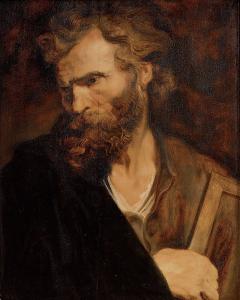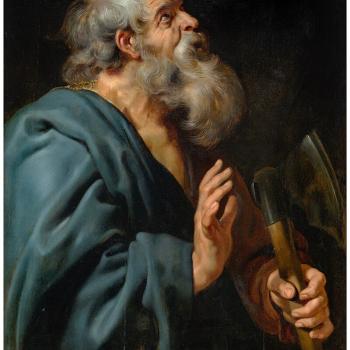In exploring the twelve apostles, we’ve looked at some who were very common and some not so common. Some, such as Peter, Matthew, and John have prolific histories. Others, such as Philip, Simon the Zealot, and James son of Alphaeus didn’t have as detailed stories. The one thing we’ve learned from each one of them by exploring their stories is that God calls all of us in diversity, recognizing different gifts, abilities, and economic standing. All did marvelous things for God in different ways.
As we make our way to the last few of the twelve apostles, we come to one of the most confounding apostles of all: the Apostle Judas Thaddeus, sometimes known as Jude, and at other times, Lebbaeus. There is no one consensus on how we identify this apostle. Regardless, he has an entire history outside of the New Testament as a prominent apostle of the early church. Read on to learn about the apostle you probably never noticed – Judas Thaddeus.
Who was Thaddeus?

The Apostle Judas Thaddeus was, most likely, born somewhere in Galilee of Judea sometime in the first century. It’s speculated that the dispute of his identity relates to efforts to clearly distinguish him from Judas Iscariot, the apostle who betrayed Jesus. Many believe he was the brother of Jesus (Matthew 13:55, Mark 6:3) or possibly the son of or brother of James (Luke 6:16, Acts 1:13). Another reference has him as the son of Clopas and Mary of Clopas, thus making him Jesus’ cousin (John 19:25). Whether or not these references are to Thaddeus the Apostle is a little unclear, but all are possible. Some also believe he might have been from Edessa (modern-day Turkey), converted by John the Baptist while attending a festival in Jerusalem. (More than likely, this “Thaddeus of Edessa” is probably a different person.)
Thaddeus, under his various identities as Jude, Judas, and Lebbaeus, is found throughout the Gospels, although usually mentioned with the other twelve. It’s unknown if he was married or had children. Tradition holds he was probably a farmer and proficient in both Aramaic and Greek.
Thaddeus’ walk with Jesus
There is only one instance where the Apostle Thaddeus interacted with Jesus independently:
“On that day you will realize that I am in My Father, and you are in Me, and I am in you. Whoever has My commands and keeps them is the one who loves Me. The one who loves Me will be loved by My Father, and I too will love them and show myself to them.”
Then Judas (not Judas Iscariot) said, “But, Lord, why do You intend to show yourself to us and not to the world?”
Jesus replied, “Anyone who loves Me will obey My teaching. My Father will love them, and We will come to them and make Our home with them. Anyone who does not love Me will not obey My teaching. These words you hear are not My own; they belong to the Father who sent Me.” (John 14:20-24, NIV)
Thaddeus’ question related to Jesus’ revelation of Himself. This led to Jesus’ teaching on obedience: when Christ’s people obey His teaching, God dwells in their midst.
Thaddeus is also mentioned:
- With the other apostles: In all passages referring to the twelve as a group (Matthew 10:3, Mark 3:18, Luke 6:16).
- The Last Supper: Along with the other twelve, Thaddeus was present at the Last Supper (Matthew 26:17, Mark 14:12).
Thaddeus after the resurrection
The Apostle Thaddeus is mentioned one other time in the New Testament, found in Acts 1:12-14, speaking of the election of Matthias to replace Judas Iscariot. Here he is identified as Judas son of James:
Then the apostles returned to Jerusalem from the hill called the Mount of Olives, a Sabbath day’s walk from the city. When they arrived, they went upstairs to the room where they were staying. Those present were Peter, John, James and Andrew; Philip and Thomas, Bartholomew and Matthew; James son of Alphaeus and Simon the Zealot, and Judas son of James. They all joined together constantly in prayer, along with the women and Mary the mother of Jesus, and with his brothers. (NIV)
Note: Judas Thaddeus shouldn’t be confused with Judas Barsabbas, a different apostle mentioned later in Acts 15.
The Apostle Judas Thaddeus is traditionally identified as the author of the book of Jude. This short book, often confusing for believers today, was most likely part of an early Christian discussion on angelology.
Later accounts
The Apostle Thaddeus’ ministry took him far and wide through the ancient world. Ministry locations included Judea, Samaria, Idumaea, Syria, Mesopotamia, Libya, Edessa, and Armenia (along with the Apostle Bartholomew). He was martyred in Beirut, Lebanon along with Simon the Zealot, somewhere around 65 AD. He’s frequently pictured with a club, a scroll or book, a small image of Christ, or a carpenter’s ruler.
There is one apocryphal reference that includes the Apostle Thaddeus. It is highly unlikely he had anything to do with its contents.
Summary
Even though the Apostle Thaddeus is a little difficult to identify, we can learn much from his work. For one, believers have always wondered why God reveals some things just to those who believe, rather than the whole world. Jesus’ few words to this apostle’s question tell us much about the role of obedience and understanding in our faith. It also shows us that the most important things in our faith come through divine revelation. When we embrace such, we launch into ministries that literally change the whole world.
Jude, a servant of Jesus Christ and a brother of James,
To those who have been called, who are loved in God the Father and kept for Jesus Christ:
Mercy, peace and love be yours in abundance. (Jude 1:1-2, NIV)


















